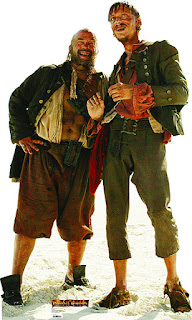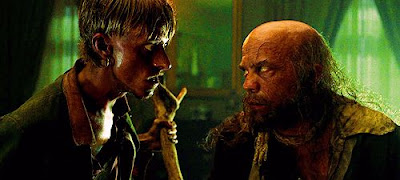One aspect of this that I want to explore though is what happens when an actor's vision of their character doesn't quite jibe with what's conveyed in the final product. I'm not talking about when the actor and the writer and/or director clash over creative differences. I'm talking about when those creative differences result in a major aspect of the character being ambiguous to the viewers. Sure, writers and directors are the top creative authorities on the overall project, but the actor is the one who delivers the performance we actually see. Does that make their word the more definitive one in the end?
Take the characters Pintel and Ragetti from the first three Pirates of the Caribbean films. Played by Lee Arenberg and Mackenzie Crook, they're a pirate duo who frequently switch allegiances depending on what's more beneficial to them, as pirates do. Unlike most duos in the series though, they never once turn on each other. They're completely loyal to one another from start to finish, and even when things descend into "every man for himself," they still more or less work as a team with their shared wellbeing in mind.
The movies (produced by Disney in the early-to-mid 2000's, mind you) seem to present them as just really good friends who have each other's backs because they've been through so much together. In fact, Pintel was a solo character in the first draft of the script, so it makes sense that splitting him into two characters in later drafts would result in a duo that always works together. However, a lot of viewers genuinely believe that he and Ragetti are a homosexual couple. There's even a deleted scene from the first film where Pintel mentions that he "used to date a eunuch." What complicates this further is that Lee Arenberg has said that he and Mackenzie Crook came up with the idea before filming that their characters were actually uncle and nephew.
Yo ho ho and a bottle of rum, aye?
Personally, I always favored the uncle and nephew theory since it came from the actors themselves. If that was how they played their roles, then it has to be what their characters' relationship really was, right? And it wasn't like one or both of their characters couldn't still be homosexual; they just wouldn't be a couple with each other. However, this way of thinking got turned on its head just a month ago when I saw the movie Mad Max 2: The Road Warrior for the first time.
See, there's a marauding male duo in that movie too. Their names are Wez and the Golden Youth, and they spend most of their shared screen time riding on a motorcycle together while dressed in black fetish leather, complete with a dog collar and chain on the Golden Youth and "assless" chaps on Wez. Wez always sits in front on the motorcycle with those chaps, by the way. One of the heroes kills the Golden Youth during a negotiation scene about a third of the way through the film, and his death sends Wez into such a vengeful rage that the lead villain has to restrain him and remind him that every one in their group has lost "someone we love."
 The intention for these two characters would seem obvious, even for a film from 1981. However, Vernon Wells, the actor who played Wez, has a reported history of getting angry at people who insist that Wez and the Golden Youth were a couple. He's also said that director George Miller left it up to him to decide his character's backstory, which Wells decided was that of a surrogate father to the Golden Youth, and that a scene clarifying this was meant to be in the film at one point. To the best of my knowledge, no proof of this scene existing has ever surfaced, not even in older drafts of the script, and the Golden Youth was originally a female character.
The intention for these two characters would seem obvious, even for a film from 1981. However, Vernon Wells, the actor who played Wez, has a reported history of getting angry at people who insist that Wez and the Golden Youth were a couple. He's also said that director George Miller left it up to him to decide his character's backstory, which Wells decided was that of a surrogate father to the Golden Youth, and that a scene clarifying this was meant to be in the film at one point. To the best of my knowledge, no proof of this scene existing has ever surfaced, not even in older drafts of the script, and the Golden Youth was originally a female character.Taking the actor's word suddenly doesn't seem like the most credible approach anymore. Granted, there are a few differing factors between these two cases.
The Pirates movies present Pintel and Ragetti's relationship in a very broad, distant light that allows for several interpretations. Mad Max 2, in contrast, seems to give Wez and the Golden Youth's relationship one very specific undertone, unless the idea is that they just dress that way because everyone has questionable fashion in Mad Max. Lee Arenberg and Mackenzie Crook could come up with any backstory they wanted for their characters without really contradicting the writers' ideas, whereas Vernon Wells was stuck on a two-man motorcycle in assless chaps. He's going to have a harder time convincing people of his interpretation because things like the wardrobe and staging were beyond his control.
The actors themselves and the timing of their films' releases are also big factors in credibility. If Wez really is supposed to be a homosexual, it's possible that Vernon Wells was never comfortable with that idea, or else he was comfortable with it back in 1981 but his view has changed since then. Or maybe he honestly never saw the role that way during production and resents that it's been interpreted that way. Another commonly known thing about actors is that they tend to accept roles that they're not entirely passionate about or don't fully understand because work is scarce at the time, and a lot of them do look back on those roles wishing they had turned them down or played them differently. Even Viola Davis recently admitted to having regrets about her Oscar-nominated role in The Help.
The bottom line seems to be that while actors do play a key role in bringing characters to life, they don't own those characters. Therefore, their word only holds so much weight. As viewers, we can still believe them if we want to—it's always good to view art from more than one perspective—but if you want the definitive word on something in a movie, show, or stage play, you're probably better off asking the writers and directors, the people who had to envision the bigger picture.
And for the record, I still prefer to think that Pintel and Ragetti are uncle and nephew. That's partially because I've written a 155,000-word fanfiction series based on that idea, and I like it when the words that I write hold a little weight.





No comments:
Post a Comment